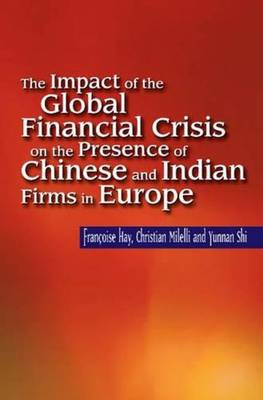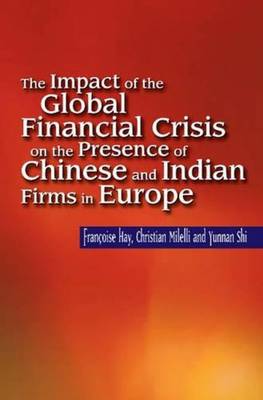
Door een staking bij bpost kan je online bestelling op dit moment iets langer onderweg zijn dan voorzien. Dringend iets nodig? Onze winkels ontvangen jou met open armen!
- Afhalen na 1 uur in een winkel met voorraad
- Gratis thuislevering in België vanaf € 30
- Ruim aanbod met 7 miljoen producten
Door een staking bij bpost kan je online bestelling op dit moment iets langer onderweg zijn dan voorzien. Dringend iets nodig? Onze winkels ontvangen jou met open armen!
- Afhalen na 1 uur in een winkel met voorraad
- Gratis thuislevering in België vanaf € 30
- Ruim aanbod met 7 miljoen producten
Zoeken
Impact of the Global Financial Crisis on the Presence of Chinese and Indian Firms in Europe
Francoise Hay, Christian Milelli, Yunnan Shi
Paperback | Engels
€ 59,45
+ 118 punten
Omschrijving
This book investigates the presence of Chinese and Indian companies in Europe and the impact that the current global financial crisis has had on their corporate behaviour and strategies. Have investments been cancelled or postponed? Has the crisis created new opportunities for investment? Is the behaviour of Chinese and Indian firms to these new circumstances similar? In addressing these challenging questions the authors used a proprietary data base encompassing over 1,500 investments (greenfield operations, mergers-and-acquisitions, joint ventures, horizontal/vertical extensions) made throughout Europe by companies from China (Mainland and Hong Kong) and India since the 1990s. Comparisons were made according to several criteria (eg: spatial patterns, modes of entry, sector and function distribution) -- to pinpoint differences and likenesses. In addition, face-to-face interviews were conducted in order to elaborate congruent case studies in traditional sectors (textile/clothing), or in new sectors (software for Chinese companies). The crisis had an impact on both investors in the following terms: lower amounts of investment, more merger-and-acquisition deals in absolute and relative terms, more focus on the largest economies (particularly the UK), and a targeting of specific assets such as critical technologies, international management capability, renowned brands and sale networks. In conclusion, in the years following the global financial crisis Indian investments in Europe have been more significantly affected than Chinese investments due, to a large extent, to the support of the Chinese state.
Specificaties
Betrokkenen
- Auteur(s):
- Uitgeverij:
Inhoud
- Aantal bladzijden:
- 91
- Taal:
- Engels
Eigenschappen
- Productcode (EAN):
- 9781845195083
- Verschijningsdatum:
- 30/08/2011
- Uitvoering:
- Paperback
- Formaat:
- Trade paperback (VS)
- Afmetingen:
- 139 mm x 217 mm
- Gewicht:
- 154 g

Alleen bij Standaard Boekhandel
+ 118 punten op je klantenkaart van Standaard Boekhandel
Beoordelingen
We publiceren alleen reviews die voldoen aan de voorwaarden voor reviews. Bekijk onze voorwaarden voor reviews.











